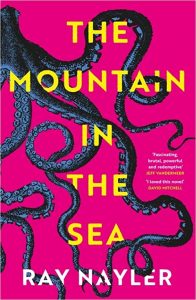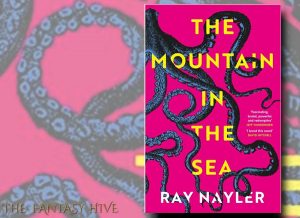THE MOUNTAIN IN THE SEA by Ray Nayler (BOOK REVIEW)
 The Mountain in The Sea
The Mountain in The Sea
Ray Nayler
Insta: @raynayler @wnbooks
Twitter: @raynayler
Fear: How have the monsters learned to speak?
Called “One of the up-and-coming masters of SF short fiction” by Locus, Ray Nayler’s critically acclaimed stories have seen print in Asimov’s, Clarkesworld, Analog, The Magazine of Fantasy and Science Fiction, Lightspeed, Vice, and Nightmare, as well as in many “Best Of” anthologies, including The Very Best of the Best: 35 Years of The Year’s Best Science Fiction. His story “Yesterday’s Wolf” won the 2022 Clarkesworld Readers’ poll. In the same year, his story, “Muallim” won the Asimov’s Readers’ Award, his story “Father”, in French translation, won the Bifrost readers’ award, and his novelette “Sarcophagus” was a finalist for the Theodore Sturgeon Award. Ray’s story “Winter Timeshare” from the January/February 2017 issue of Asimov’s was collected by the late Gardner Dozois in The Very Best of the Best: 35 Years of the Year’s Best Science Fiction.
Ray Nayler’s The Mountains Under the Sea, asks uncomfortable questions in a brutal and bludgeoningly tragic way. Nayler confronts questions concerning nonhuman intelligence and consciousness, AI and otherness, whilst deconstructing who we are and what have done – for better or for worse.
‘Despite everything we have done to the ocean, despite everything we have done to this world, life finds a way’
In the water around Con Dao, there are monsters. Con Dao is a small island, which was once home to many and a popular place for visitors interested in the ocean, sea turtles and diving. The locals on Con Dao told stories about the monsters, stories no one but the witnesses ever believed. The transnational tech corporation DIANIMA purchased the island, expunging the locals, sealing off the archipelago from the rest of the world. DIANIMA took over the island to ‘protect the wildlife,’ and the sea turtle breeding areas. Other than the wildlife reclaiming the decaying hotels and empty beaches, the only inhabitants are the robotic Buddhist automonks at the island’s monastery, who’s presence DIANIMA could not remove.
‘We are built for communication. Only death brings silence’ – Dr Ha Nguyen. How Oceans Think
Dr Ha Nguyen visited Con Dao as a child. She swam in the life-filled oceans, learnt about heart-break, and grief, and guilt and shame. Ha learnt about love on the island and found her passion for sea life and the octopuses. Years later, DIANIMA invited Dr Nguyen back to the island, because they found something, and they have asked for her help. Upon arriving at the island, Ha realises that other than the automonks, there are only two others on the island, Altantsetseg; security personnel and veteran of the war, as well as Evrim.
‘I see you know who I am
Did she? What did she know? Ha’s mind ran down the list of what Evrim was: Evrim was the only (allegedly) conscious being humankind had ever created. An android, finally realized. […] The moment, it was said repeatedly, that humanity had been waiting for: conscious life from nothing but the force of our own technological will.’
There are stories of Con Dao’s ‘monsters,’ freckled throughout the narrative. As well as, what appears to be, the main plot, following Dr Ha Nguyen’s return to Con Dao, Nayler stitches small stories and sub-plots into the pages, stories from the locals who had experiences with the monster and what happened afterwards. Alongside stories of Con Dao, and it’s monsters, we are drip fed stories from the world away from the island. Stories that highlight the speculative path that humans are stumbling down. From the stories within modern slave ships, to the use of AI to create the ‘perfect’ companions, we are shown a future where humans replace technology because ‘We make better robots. Cheaper to maintain, more expendable’ and technology replaces humans socially, with more and more people choosing an AI companion over a relationship with another human.
‘Yes. This was why the world would never build another humanoid AI. The smile was perfect. Sincere, unaffected. Fully human.
And because of that, the smile was like the shadow of your own death.’
Nayler disrupts our positions in the world, by introducing the question – what if?
What if we found a species on our planet who had intricate and detailed communication, as we do? What if a species on earth used symbols, and poetry and taught their young? There has been an echo throughout time, concerning communication and language, and the naïve and anthropocentric assumption that what separates humans and non-human animals is language. Aristotle suggested that language was one of the things that made humans superior, because humans were the only species that mother nature had given the gift of speech. This assumption and anthropocentrism has excited throughout various time periods and cultures, constructed a humanist hierarchy and Nayler does much to deconstruct this, and inform us:
‘Communication is not what sets humans apart. All life communicates, and at a level sufficient to its survival. Animal and even plant communications are, in fact highly sophisticated. But what makes human different is symbols – letters and words that can be arranged in the self-referential sets we call language’.
Nayler uses his novel to consider questions around communication, language and what we have done to the planet, as Derrida asks – what if the animal responded? And what if that animal was an octopus?
Nayler’s novel is beautifully uncanny, disturbingly delicate but disruptive, and one I look forward to reading again. Nayler does much to remind us that no matter how arrogant humanity may be, we are certainly not alone.
‘But what could be more illusory that the world we see? After all, in the darkness inside out skulls, nothing reaches us. There is no light, no sound – nothing. The brain dwells there alone.’ – Dr. Arnkatla Minervudottir-Chan, Building Minds

